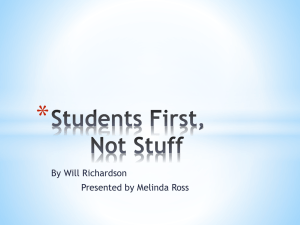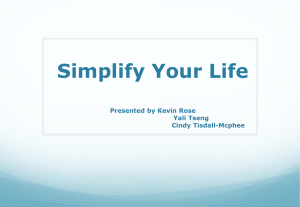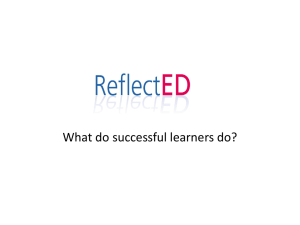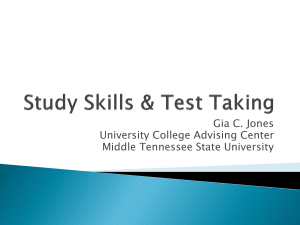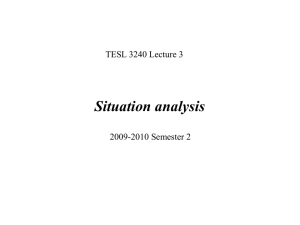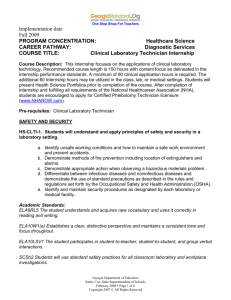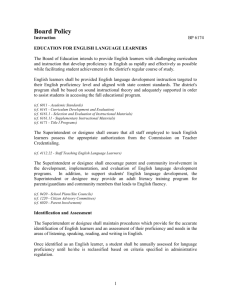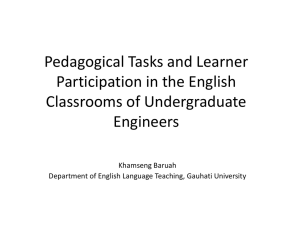The Essential Eight: Creating Conditions for Learning
advertisement
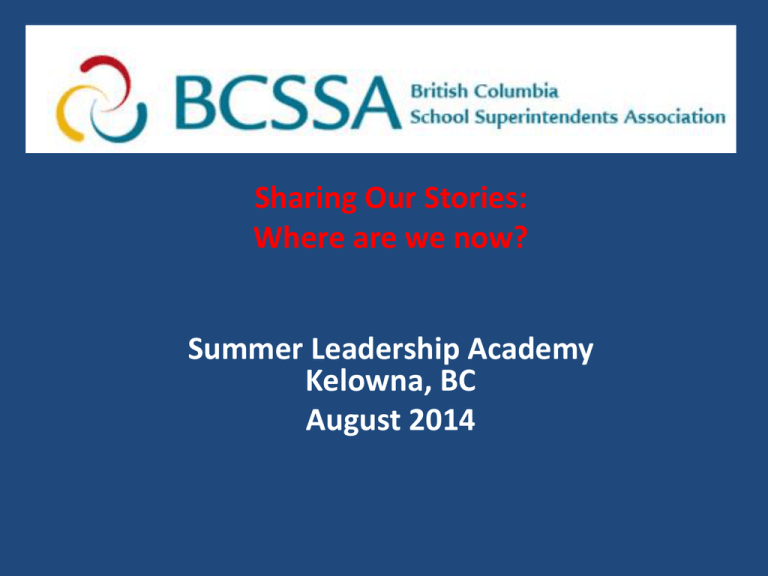
Sharing Our Stories: Where are we now? Summer Leadership Academy Kelowna, BC August 2014 Essential 8: Systems Thinking and Planning on a District Scale School District No. 57 (Prince George) Brian Pepper, Superintendent Enrolment • • • • • • • • K-7 8-12 Aborig. ELL Sp Ed FI K-7 FI 8-12 DL 7233 6053 3556 1324 1282 695 228 530 A System in Action Senior Learning Team: Putting Learners First Our Senior Learning Team consists of representatives from across the organization Technology Aboriginal Education Assistant Superintendent Student Support Services Superintendents Student Learning Human Resources Curriculum and Instruction Data Management Finance Our Work • The Senior Learning Team is a think-tank with an action-oriented approach to innovation with a focus on improving student learning. Our goal is to find processes, on a systems level, to improve the life chances of each student. The SLT is tasked with challenging the status quo to move our district from good to great. Invitation Dream big for learners! Catalyst for systemic change! Change organizational culture! • Continual feedback from students, parents, teachers, business and community provided the fuel! It started with a RANT!!! . . . . . that grew, through collaboration, into “possibility” . . . . . that became a possible framework for system change Start with “WHY” • In a learning organization, why we undertake a project must align with a vision for learning. • Why we undertake a project must acknowledge the vast range in vulnerability in our school district so we can better meet the needs of all learners. • When gauging why, consider – does it improve the life chances of each student? • Once the merits for why have been considered, then the how and the what can be determined. Guiding thoughts • Vision: Learning that enriches the life of each student • Board Guiding Principle: Students have a right to have their intellectual, emotional, physical and social needs met. • Board Guiding Principle: Employees have a right and a responsibility to explore, collaborate and develop to their potential. • Money is not an excuse for inaction! Elements of an Effective Learning Plan • Focus on student learning • Provided flexibility and choice • Improve use of technology in the fabric of learning • Recognized learning needs of each student • Demanded high standards - especially of staff Assessment For Learning The process of collecting evidence of student learning. Assessments provide results to inform decisions. Formative assessment, serves the purpose of tracking and promoting learning along the way (assessment for learning). Assessment for learning offers the greatest promise of helping all students to succeed (helping students meet standards) Educators need to be assessment literate, understanding the principles of sound classroom assessment practice. Data-Driven Evidence For Learning Data as part of ongoing cycle of instructional improvement. The use of data to inform instruction. The use of profiles and formative assessment to provide evidence of learning. Improve staff understanding, knowledge, skills re utilization of data/evidence including: a. Using data to modify teaching and learning practice b. Using data to answer questions about student achievement/learning c. Teacher collaboration d. Fostering a culture of data based decision making e. Data system utilization(AMS) Cultural Competencies Allows individuals (students and staff) to interact effectively (understand, communicate with) with people of different cultures and socio-economic backgrounds. Four components: a. Awareness of one’s own cultural worldview b. Attitude towards cultural differences c. Knowledge of different cultural practices and worldviews d. Cross-cultural skills Social and Emotional Learning Develop ability for students to: 1. Understand emotional needs. 2. Respect self and others 3. Develop cooperative relationships. Social and emotional learning enhances academic achievement, helps students develop self-management and self-control, improves relationships, reduces conflict, improves classroom management, and helps young people’s health and success at school and in life. Poverty and Student Learning Understand the culture of poverty. Assess vulnerability. Equip staff with interventions helpful in raising achievement for disadvantaged students: 1. Develop oral language skills. 2. Understand social conventions. 3. Develop respectful relationships. Differentiation/Universal Designs for Learning Development of flexible learning environments that can accommodate individual learning differences. Increase learning by reducing physical, cognitive, intellectual, and organizational barriers to learning – inclusion Curriculum (instructional goals, methods, materials, assessment) created to provide: a. Multiple means of representation to give learners various ways of acquiring information and knowledge b. Multiple means of expression to provide learners alternatives for demonstrating what they know c. Multiple means of engagement to tap into learners’ interests, challenge and motivate Enhanced Learning through Technology Develop the processes of integrating technology into the learning environment (communication, research, graphic organizers, presentation) To enable more self-directed learning – students construct their own understanding Supervision of Instruction, Mentorship and Training Reinforce and enhance teaching practices that contribute to improved student learning Meaningful feedback and direction to teachers Enhance programing and teaching strategies designed to meet the diverse needs of all students. Initiative Development • Embedded: Budget Process, Superintendent’s Report on Achievement, District Achievement Contract • District Principal Meetings • School Plans • Staff meeting learning focus • Professional Development 2014-15 • Key element District Strategic Planning Process • Department Focus • 2 Principals @ .5 each to support directions and provide “at shoulder support” to P/VP • 6 teachers @ .5 each to provide “at shoulder support” and coordinate inservice • Inservice Focus Make a Connection • Given your district’s context, how might you look at one of the Essential Eight from a systems perspective? o AFL o Data-Driven Evidence for Learning o Cultural Competencies o Social and Emotional Learning o Poverty and Student Learning o Differentiation and Universal Designs for Learning o Enhancing Learning through Technology o Supervision of Instruction and Mentorship / Training Think. Pair. Share. Thank You! For more information: Lisa Carson: lcarson@sd57.bc.ca Cindy Heitman: cheitman@sd57.bc.ca Brian Pepper: bpepper@sd57.bc.ca




